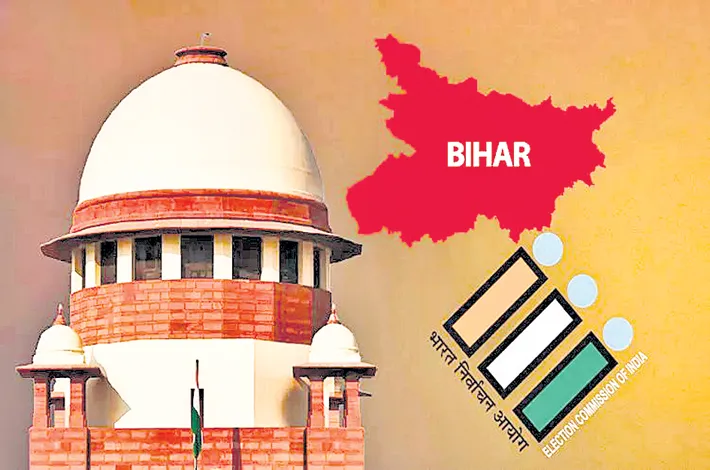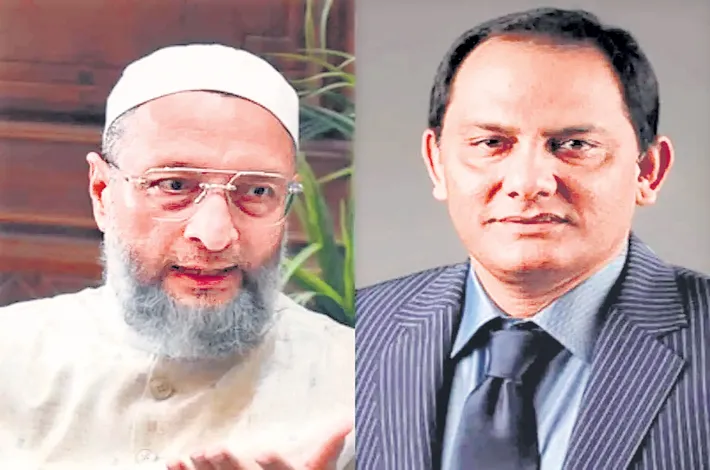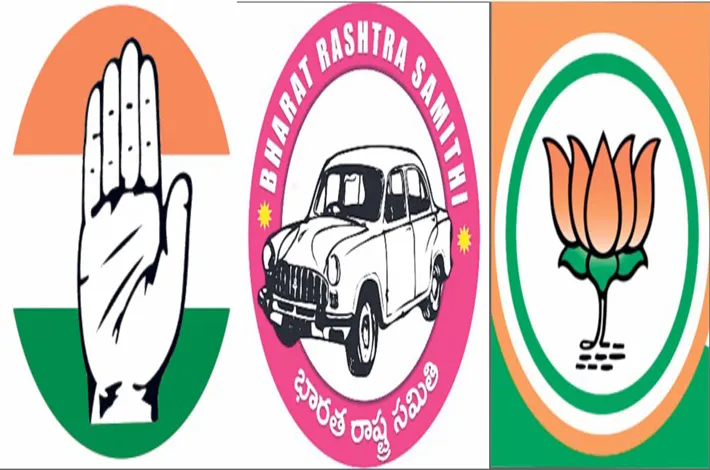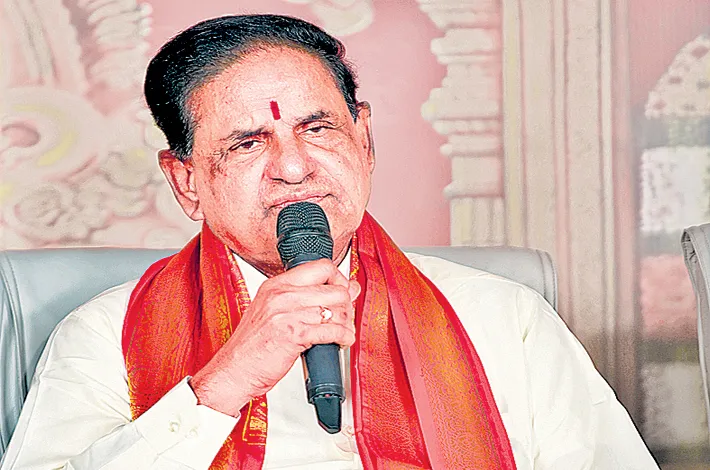Aadhaar, Voter ID, and Ration Cards Not Reliable Documents
23-07-2025 12:00:00 AM

ECI Tells Supreme Court in Bihar Electoral Roll Revision Matter
metro india news I new delhi
In a significant development that could reshape India’s electoral processes, the Election Commission of India (ECI) has informed the Supreme Court that Aadhaar cards, voter ID cards, and ration cards are not reliable documents for verifying voter identities during electoral roll revisions. The statement was made in response to a public interest litigation (PIL) filed in the Supreme Court concerning alleged irregularities in the revision of electoral rolls in Bihar, raising concerns about the integrity of voter lists and the documents used to authenticate them.
The PIL, filed by a group of activists led by advocate Rajesh Kumar, alleged that the electoral rolls in several constituencies in Bihar contained duplicate, fraudulent, and ineligible entries, which could compromise the fairness of upcoming elections. The petitioners sought stricter verification processes to ensure the accuracy of voter lists, particularly in light of complaints about non-residents and deceased individuals being included in the rolls. The case has drawn national attention, as it touches on the credibility of India’s electoral system and the mechanisms used to maintain voter databases.
During the hearing, a bench comprising Justices Sanjiv Khanna and Sanjay Kumar questioned the ECI on the methods employed to verify voter identities and address discrepancies in the electoral rolls. The ECI, represented by senior counsel Maninder Singh, submitted that while Aadhaar, voter ID, and ration cards are commonly used as proof of identity or residence, these documents are not foolproof. The Commission argued that these documents lack the robustness required to serve as definitive proof of eligibility for voter registration, citing issues such as duplication, outdated information, and fraudulent issuance.
ECI’s Stance on Document Reliability
The ECI’s submission to the Supreme Court highlighted specific concerns with each document. Aadhaar, a 12-digit unique identification number issued by the Unique Identification Authority of India (UIDAI), was flagged for its lack of address verification and instances of multiple cards being issued to the same individual under different names. The ECI noted that while Aadhaar is useful for linking voter IDs to prevent duplication, it cannot independently confirm residency or eligibility, as it is not restricted to Indian citizens.
Voter ID cards, issued by the ECI itself, were also deemed unreliable as standalone documents due to errors in data entry, outdated photographs, and cases of fraudulent issuance. The Commission admitted that discrepancies in voter ID details, such as incorrect addresses or names, have been reported in several states, including Bihar, complicating the verification process.
Ration cards, used as proof of residence in many cases, were criticized for their susceptibility to manipulation and outdated information. The ECI pointed out that ration cards are often issued to entire households, making it difficult to ascertain individual eligibility, and are sometimes retained by families even after a member’s death or relocation.
The ECI emphasized that while these documents are widely accepted for various purposes, their limitations necessitate a more robust verification mechanism, such as physical verification or cross-referencing with other government databases. The Commission has proposed integrating electoral rolls with the National Population Register (NPR) or other verified databases to enhance accuracy, though such measures are yet to be implemented nationwide.
Context of the Bihar Case
The Bihar electoral roll revision issue stems from complaints lodged during the 2024 general elections, where opposition parties and civil society groups flagged irregularities in voter lists across multiple constituencies. Reports of “ghost voters” – entries for deceased or non-resident individuals – and duplicate registrations sparked outrage, prompting the PIL. The petitioners argued that such discrepancies could enable electoral fraud, including impersonation and illegal voting, undermining the democratic process.
The ECI, in its affidavit, acknowledged that the revision of electoral rolls in Bihar had faced challenges due to inadequate verification processes and reliance on documents now deemed unreliable. The Commission informed the court that it has initiated a special summary revision of electoral rolls in Bihar, deploying Booth Level Officers (BLOs) to conduct door-to-door verification in affected constituencies. However, the ECI cautioned that without a standardized, foolproof verification system, such issues could persist.
Implications for India’s Electoral System
The ECI’s admission has far-reaching implications for India’s electoral framework, which serves a voter base of over 900 million. The reliance on Aadhaar, voter ID, and ration cards has been a cornerstone of voter registration and verification processes for decades. Questioning their reliability raises concerns about the integrity of the electoral rolls and the potential for disenfranchisement or fraudulent voting.
Legal experts have described the ECI’s statement as a wake-up call for reforming voter verification processes. “The ECI’s acknowledgment that these documents are not reliable is a bold step, but it also exposes systemic flaws,” said constitutional lawyer Anil Sharma. “The government and the ECI must now work together to develop a more secure and transparent system, possibly leveraging technology like biometrics or blockchain to ensure accuracy.”
The Supreme Court has directed the ECI to submit a detailed report on the steps being taken to address the Bihar issue and to propose a long-term plan for improving voter verification nationwide. The court has also asked the petitioners to provide specific evidence of irregularities to aid the investigation. The case is scheduled for further hearing in August 2025.
Public and Political Reactions
The ECI’s stance has sparked a heated debate among political parties and civil society. Opposition parties, including the Rashtriya Janata Dal (RJD) and Congress, have accused the ECI of failing to maintain accurate voter lists, claiming that discrepancies disproportionately affect marginalized communities. Meanwhile, the ruling Bharatiya Janata Party (BJP) has called for a collaborative approach to strengthen the electoral system, emphasizing the need for technological interventions.
Activists have expressed mixed reactions. While some see the ECI’s admission as a step toward accountability, others worry that questioning the reliability of widely used documents could lead to voter suppression, particularly among the poor and migrant populations who rely on ration cards and Aadhaar for identification.
Looking Ahead
As India gears up for state elections in 2026, the Supreme Court’s ruling in this case could set a precedent for how voter rolls are managed across the country. The ECI’s push for alternative verification methods, such as NPR integration or biometric authentication, could modernize the electoral process but also faces challenges related to infrastructure, privacy concerns, and implementation costs.
For now, the focus remains on resolving the Bihar issue and ensuring that the electoral rolls reflect the true will of the electorate. The ECI’s candid admission in the Supreme Court underscores the urgency of reforming a system that has long relied on documents now deemed inadequate. As the nation watches, the outcome of this case could redefine the standards of electoral integrity in the world’s largest democracy.








